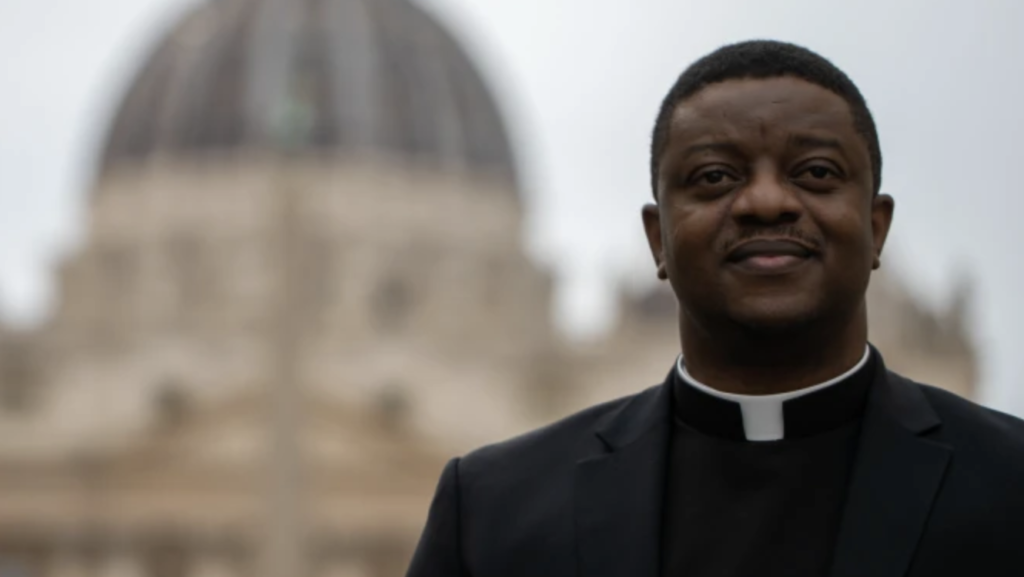Around 500 priests instituted as Missionaries of Mercy are in Rome March 28–30 to take part in events for a special jubilee dedicated to their role, part of the wider 2025 Jubilee of Hope.
Pope Francis commissioned the Missionaries of Mercy in 2016 during the Extraordinary Jubilee of Mercy. Missionaries of Mercy are priests with faculties to hear confessions all over the world and to absolve certain sins previously reserved to the Holy See.
The pontiff has twice extended their original mandate and the number of Missionary of Mercy priests continues to grow, now numbering more than 1,200 around the world.
There are about 100 Missionaries of Mercy in the U.S., and one of these said it has been “life-changing” to have this ministry of mercy be part of his priesthood.
“The life of a priest is a life going in all directions, different directions, all at the same time. Being a Missionary of Mercy has given my life so much focus,” Father Augustine Deji Dada of the Archdiocese of New York told CNA in Rome.
Dada, who is from Nigeria, has been serving at Our Lady of Mount Carmel Church in Elmsford, New York, since 2017.
“That is also the theme that draws me to the priesthood in the first place, to be able to help people, to be able to be there for those who need me, whether for the sacraments or just for support in their lives,” Dada added.
“And now you have the Holy Father giving you the mandate to go … put this into the context of every other thing you do.”
The Jubilee for Priests Instituted as Missionaries of Mercy began on Friday with morning and afternoon training sessions, which Dada said are lectures on theology, canon law, and best practices regarding the sacrament of confession.
The sessions are also an opportunity for the priests to share with one another about what it is like to be a Missionary of Mercy in different parts of the world or in different contexts, like a parish or school.
“More or less it’s training on really how not to be the judge, but to be the kind father who … through the sacrament of reconciliation welcomes … the lost child back in the name of the Church and the name of God the Father, through the authority of Christ,” Dada explained.
This year’s edition of “24 Hours for the Lord,” taking place March 28-29, is part of the program for the Jubilee of Missionaries of Mercy. The night- and daylong event of confessions and Eucharistic adoration was started by Pope Francis during the Lenten season of 2013.
In Rome, the worldwide initiative will begin with a liturgy with the Missionaries of Mercy in the Basilica of Sant’Andrea della Valle.
The following morning, on March 29, the priests will make a pilgrimage through the Holy Door of St. Peter’s Basilica before praying a rosary in the Lourdes Grotto of the Vatican Gardens. The weekend will close with Mass on March 30 in the Basilica of Sant’Andrea della Valle.
“Mercy and hope share a very important link,” Dada said. He noted that hope is connected to waiting and expectation, while jubilees are about being freed from sin.
“I believe that’s part of the reason the celebration of the Jubilee of Priests instituted as Missionaries of Mercy is also included in the Jubilee of Hope,” Dada said. “So that we can go out there and remind everyone of this connection: that while we wait, we must embrace God’s mercy.”
Pope Francis in Spes Non Confundit, his bull of indiction for the jubilee year, wrote that “during the coming jubilee, may [Missionaries of Mercy] exercise their ministry by reviving hope and offering forgiveness whenever a sinner comes to them with an open heart and a penitent spirit.”
“May they remain a source of reconciliation and an encouragement to look to the future with heartfelt hope inspired by the Father’s mercy,” the Holy Father said.

